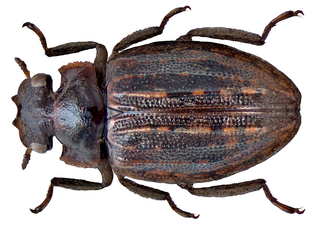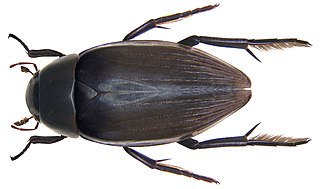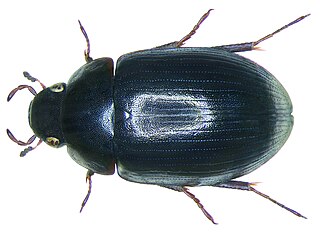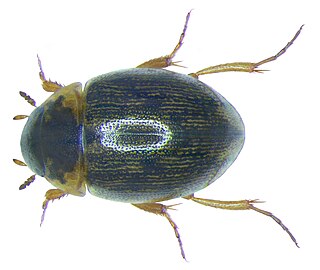
Spercheus is a genus of aquatic beetles which are placed in a family of their own, Spercheidae within the Hydrophiloidea. About 20 species are known from around the world except the Nearctic with the majority being from the Oriental and Afrotropical Realms.

The Hydroscaphidae are a small family of water beetles known commonly as skiff beetles. As of 2010, there are 23 species in the family. Several are recently described.

Hydrophilidae, also known colloquially as water scavenger beetles, is a family of beetles. Aquatic hydrophilids are notable for their long maxillary palps, which are longer than their antennae. Several of the former subfamilies of Hydrophilidae have recently been removed and elevated to family rank; Epimetopidae, Georissidae, Helophoridae, Hydrochidae, and Spercheidae. While the majority of hydrophilids are aquatic, around a third of described species are terrestrial, mostly belonging to the subfamily Sphaeridiinae.

Myxophaga is the second-smallest suborder of the Coleoptera after Archostemata, consisting of roughly 65 species of small to minute beetles in four families. The members of this suborder are aquatic and semiaquatic, and feed on algae.

Hydrophiloidea, known as water scavenger beetles, is a superfamily of beetles. Until recently it included only a single family, the Hydrophilidae, but several of the subfamilies have been removed and raised to family rank. Hydrophiliidae remains by far the largest member of the group, with nearly 3,000 described species. The other families have no more than 400 species. The Histeroidea are closely related and sometimes considered part of a sensu lato Hydrophiloidea. The majority of the clade is aquatic, which is thought to be the ancestral ecology of the group, with some lineages like Sphaeridiinae becoming secondarily terrestrial. Modern representatives of the group first appeared during the Late Jurassic.

Hydrophilus is a genus of beetles in the family Hydrophilidae, the water scavenger beetles. There are 53 species in three subgenera in the genus: Hydrophilus, Dibolocelus, and Temnopterus.

Hydrophilinae is a subfamily of Hydrophilidae that contains five tribes in 33 genera after the classification was revised by Short and Fikáček in 2013.

Berosus is a genus of beetles in the family Hydrophilidae, the water scavenger beetles. The genus contains 273 species. It is distributed worldwide.

Hydrophilini is a tribe in the subfamily Hydrophilinae of aquatic beetles that contains 204 species in 7 genera.

Hydrobiusini is a tribe in the subfamily Hydrophilinae of aquatic beetles, and containing 47 species in 9 genera.

Anacaenini is a tribe in the subfamily Hydrophilinae of aquatic beetles, and it contains 256 species in 6 genera.

Chaetarthriinae is a subfamily in the family Hydrophilidae of aquatic beetles, and it contains 92 species in 8 genera.

Laccobiini is a tribe in the subfamily Hydrophilinae of aquatic beetles, and it contains 367 species in 8 genera.

Sperchopsini is a tribe in the subfamily Hydrophilinae of aquatic beetles, and it contains 24 species in 5 genera.

Cymbiodyta is a genus of hydrophilid beetles with 31 species. Twenty–eight of the species occur in the Americas and three species in the Palearctic.

Hydrobiomorpha is a genus of water scavenger beetles in the family Hydrophilidae. There are 56 extant described species in Hydrobiomorpha, along with several fossil species.

Epimetopidae is a family of semi-aquatic beetles belonging to the Hydrophiloidea. They are found in sand and gravel at the edges of streams, rivers and shallow freshwater ponds. These beetles are shorter than half a centimeter long and have a pronotum with a central projection forming a shelf above the head. On the underside of the abdomen only four sternites are visible. There are approximately 72 described species in three genera, Epimetopus which is restricted to the New World, mostly Neotropical, Eupotemus with two Afrotropical species and Eumetopus with some Oriental species. Females carry their eggcases on the underside of the abdomen. The larvae are probably carnivorous based on their mouthparts and likely live in the same habitats as the adults.
Brownephilus is a genus of water scavenger beetles in the family Hydrophilidae containing two described species. Brownephilus was formerly a subgenus of Hydrobiomorpha and was elevated to genus by Andrew E.Z. Short in 2010.
Protistolophus spangleri is a species of water scavenger beetles in the family Hydrophilidae and the only species in the genus Protistolophus. Protistolophus spangleri was described as a new species and genus by Andrew E.Z. Short in 2010. The species is known only from Venezuela.
Amphiopini is a tribe in the subfamily Hydrophilinae of aquatic beetles, which was first described in 1890 by August Ferdinand Kuwert, and which has been synonymised with Chaetarthriini.
















